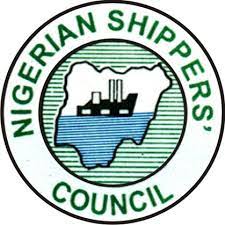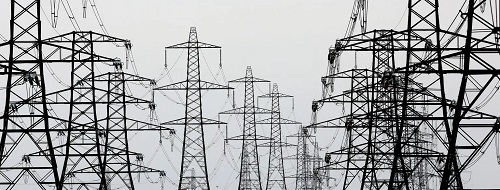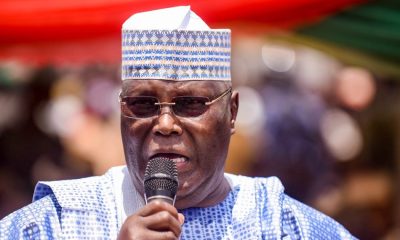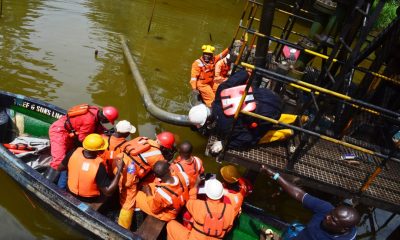BUSINESS
ACCI, Stakeholders Seek Emergency Declaration on Export Sub-sector

By Tony Obiechina, Abuja
The President, Abuja Chamber of Commerce and Industry (ACCI), Dr Al-Mujtaba Abubakar and stakeholders in the export business have called for declaration of a state of emergency to remove bottlenecks in the processing of non-oil exports in Nigeria. Non-oil exporters in Nigeria raised the alarm over serious constraints facing them in the export business, describing the situation as constituting threats to government’s efforts to increase non-oil revenue earnings.
The study report had listed several challenges militating against deployment of dry ports in the logistic chain, calling for urgent intervention to address critical weaknesses in the export chain business within the context of the African continental free trade zone (AfCFTA).
Opening the Public Private Dialogue attended by Agencies of the transportation Ministry, commodity Associations, Exporters and other staff holders, the ACCI President, Dr. Abubakar said, all hand must be on deck to ease the burden of export if Nigeria is to expand her revenue earnings and meet the demands of new continental free trade regime.
Abubakar who linked the achievement of huge export trade volume to strong hither-land logistics like ports and rail said the dry ports report provides opportunities for all stakeholders to declare emergency in the export sub-sector because of the complicated nature of problems confronting exporters in Nigeria.
He added that economic development is best escalated when multi-modal transportation model is the backbone of the economy adding that this is true of developed economy and even truer of developing space as Nigeria.
“This reality underpins the interest of the Abuja Chamber of Commerce and Industry to partner development organizations for the study and deployment of best practices and policies in various sectors of the Nigerian economy.
“As part of the ongoing processes, the Public Private Dialogue is a step further to intimate the relevant agencies of government and actors in the port space of the outcome of the assessment. Our goal is to sensitize the authorities to the critical importance of dry port as an expander and booster of hinterland economy. The gathering of several parties creates opportunities for considerations of best practices as Nigeria build up her networks of dry ports.”
The ACCI commended the German Development Agency (GIZ), the European Union and others for the facilitation of the assessment study. The partners support in the transport and other sector has tremendously assisted Nigeria to institute best practices in various sectors of her economy. We hope to proceed to partner further for the development of a National Policy on Day Port in Nigeria.
This assessment report is an invaluable resource material for all stakeholders in the dry port sub-sector.
The Director General, ACCI Victoria Akai in her opening remarks said, the Nigerian logistic sector is undergoing extensive expansion across transport, and logistic modes while saying that as Nigeria is expanding her Railway Ports, roads, Air ports and other infrastructures, Dry Port has emerged as a major focus along the logistic change, “creating necessary policy framework is therefore, a necessity and ACCI with her partners, is spear heading this move.
“A study has been conducted and conclusions have been reached. This is a major step towards creating a policy framework for the operation of dry port in Nigeria”, she said.
The Executive Secretary, Nigeria Shippers Council Hon Emmanuel Jime at the event said they are not unaware of the operational challenges of the Kaduna Inland Dry Port, which could be attested through the various initiative aimed at solving these problems and right now, a sensitization workshop is going on in Kaduna to enlighten stakeholders.
The ES represented by the Deputy Director Abuja Liaison office, Mrs. Rakiya Nuhu said one of the major policy initiatives of the Nigerian Shippers’ Council is the development of Inland Dry Port while saying that maritime infrastructure is the backbone to development and growth of the maritime sector and its sub-sectors in the littoral Countries across the world.
“Continuous investment in maritime infrastructure when pursued vigorously can lead to appreciable economic growth and development”, he said.
He stated the benefits of Inland Dry Ports amongst others as; bringing shipping services to the doorstep of shippers across the nation, assist in decongesting the seaports and making them more friendly, Provide the impetus to revive and modernize the railway as a primary mode for long distance haulage and assist in the reduction of over-all costs of cargo to hinterland locations as well as transit cargoes to landlocked countries.
The Managing Director, Kaduna Inland Dry Port, Mr. Ismail Adekola Yusuf in his address said, Dry Ports are normally considered for development at a location with various transport links such as highways, railways and inland waterways.
“Dry ports function as an integrator of various modes of transportation by encouraging intermodal transport operations. Intermodal transport is an integrated process where all parts of the transport process, including organizational and technological arrangements must be well connected and coordinated to produce significant proven advantages compared to single mode transportation.”
Mr. Ismail who was represented by the Mr. Chuka Offor said Dry Ports provide a range of services such as container handling and storage, container stripping and stuffing, break bulk cargo handling, customs inspection and clearance, container light repairs, freight forwarding and cargo consolidation services, inventory management and materials handling.
According to him, Dry ports are to enhance the maritime business and trigger regional economic development. The prospect of Kaduna inland dry ports is to accelerate national and international business. It promotes more investment in the region and increases cross-border transactions.
This will attract a lot of manufacturing companies’ site their factory around the dry port for ease and efficient logistics services thereby generating employment opportunities for teaming youth.
“Besides enhancing cross border transactions, it been performed as container consolidation and deconsolidation interface into some states which has no ports. Services such as customs services, client’s facilities, brokers, forwarding agents and transportation advises are highly required by the stakeholders.
“The presence of dry ports will assist the seaports to improve their effectiveness and efficiency in operations. Additional space and adequate multimodal transportation systems in dry port provide high relief to seaports and ease the container movement to and from seaport. It requires efficient transport facilities that move goods smoothly, safely and rapidly from door to door. Multimodal is a quality indicator of the level of integration between different modes: more integration and interconnectivity between modes, which provides efficient use of the transport system”, he noted.
Also speaking at the dialogue, the representative of GIZ, Mr. Legborsi Nwiabu said their partnership has taken them to a point where they were able to identify the challenges of Dry Ports in Nigeria thereby proffering solution on how to tackle it.
He said, they deliberately chose Kaduna Dry Port for the study while working on nine agricultural value chains in the Nigeria Competitive Project (NICOP) that gave them the understanding of the challenges of transportation as a hindrance to farmers.
“It is on that effect we commissioned a study to see how we can create awareness. Validation has been done before now but the report will help further. We are concern about the business environment and see how we can regulate and we want to join voices with ACCI to charge a way forward.”
BUSINESS
Subsidy Removal: Tinubu Kept his Campaign Promise – Akutah

Executive Secretary/CEO, Nigerian Shippers Council (NSC), Pius Akuta said President Bola Tinubu kept to his campaign promise by removing fuel subsidy.
Tinubu announced the removal of subsidy on petrol immediately he was sworn in on May 29, 2023.
“The very first day, he took a very bold initiative to remove fuel subsidies, which many of you have written and condemned in the past.
“We don’t know if other people would have had the courage to go ahead and remove it.
“All the presidential candidates at that time promised to remove the fuel subsidy but, for this President has displayed that capacity to do what he said,” he said.
According to him, Tinubu, in the last two years, took some bold steps, taking some policy directions that are shaping the economy.
He said that the country`s foreign reserves were in a bad shape when the current administration took over the government, adding that now there is significant growth.
Akutah said that the president acknowledged that there was hardship, but he stuck to that policy which has brought a lot of gains in the way of government business today.
“Even at the sub-national levels. You know that state governments have more money now; local governments have more money due to that policy direction.
“We need to commend President Tinubu for that initiative, which has put more money at the sub-national level for capital projects to spring up.
“We are seeing many states executing many projects, capital projects, and huge infrastructural developments going on in so many states,” he said.
He said that for Tinubu to have acknowledged developments in opposition states means he is eager to see the country developed in terms of infrastructure.
“It doesn’t matter whether you are in his party, but the moment you are doing the right thing, he will stand with you, and he acknowledged that publicly.
“The GDP was at one very low and the growth was very slow and sluggish before President Tinubu assumed office,” he said.
BUSINESS
Power Outage Killing Our Businesses, Enugu Residents Cry Out

Residents of Ologo, Coal Camp and Uwani areas of Enugu metropolis have decried persistent power outage in the area spanning over one week, and appealed to relevant authorities to come to their aid.
A cross section of the residents, who spoke in Enugu on Tuesday called for Gov.
Peter Mbah’s intervention to restore power supply to the area.They said that lack of power supply was affecting their businesses, households and means of livelihood.
Recall that the MainPower Electricity Distribution Company Limited (MPECL) on Aug. 4, issued a statement blaming the Enugu Electricity Distribution Company (EEDC), for the development.
According to the company, the reduction followed the decision by the Enugu Electricity Regulatory Commission (EERC) to slash electricity tariff for Band A from N209 per kWh to N160 per kWh.
Since the directive came into effect on Aug. 1, electricity consumers on Band B to E have been thrown into darkness in parts of the city, crippling many economic activities.
A welder at the Mechanic Shop in Coal Camp, Obum Chijioke, said that he had spent a lot of money on fuel to do his job adding that he went home empty handed.
According to him, it has not been easy for us in the past one week as we spend the little we make on fuel.
Chijioke appealed to the relevant authorities to look into the problem urgently and restore the energy.
A cleric in a church on Zik Avenue, who spoke anonymously, said that the church had been using diesel for its activities including services and it was taking a toll on them.
“We spend between N25,000 and N30,000 on diesel daily for our activities and it is not easy at all,”.
A retail shop operator, Chika Alejim, decried the situation, saying that it had affected her business.
She said she had not been able to chill her drinks and sachet water, which were the mainstay of her business.
According to her, the business was no longer booming unlike before, thereby, affecting her profits and incurring more expenses.
“I buy fuel of N20, 000 daily; I spend N10, 000 on fuel in the morning and another N10,000 at night and all these expenses eat deep into my profits.
“Also, the ice fish and meat, which I sell to support the provision store, got spoiled due to power outage,” she said.
In the same vein, Charles Ako, a business centre operator said that he no longer cope with the huge cost of keeping the centre functional.
“I have stopped those undergoing computer training due to absence of power supply.
“I use little fuel. I have to do photocopy and printing when a customer comes.
“I don’t know when the power issue will be sorted out; I am appealing to those concerned to help Enugu people because we are suffering,” he said.
Also speaking, a housewife, Ukamaka Ugwu described the effect of lack of power supply as serious, saying that it had pushed up the family’s daily expenses.
She said she had stopped cooking in large quantities because there was no electricity to preserve the food.
Meanwhile EERC, in a statement on Aug. 10, said steps were being taken to resolve the power shortage.
The commission revealed that it had met with both EEDC and Main Power in a bid to restore normalcy.
BUSINESS
Nigeria Requires $120bn to Build Federal Roads – TUC

The Trade Union Congress of Nigeria has stated that the country would need an estimated $120bn to construct its federal road network, a sum that is roughly four times the size of its annual budget.
The union described the gap between Nigeria’s infrastructure needs and available resources as alarming, accusing much of the political leadership of lacking the vision and innovation required to revive the economy.
Speaking at the second edition of the TUC South-West Summit 2025 in Lagos, TUC President-General Festus Osifo cited a 2013 study that put the cost of constructing all federal roads at $120bn.
He noted that Nigeria’s current budget, which stands between $30bn and $35bn, is already heavily committed to salaries, education, healthcare, defence, and other essential services.
“If constructing all our roads will cost $120bn, and the size of our budget is $30bn, it means we need four times our budget just to fix roads, without paying salaries, funding education, or providing healthcare,” Osifo told delegates. “This is why we must grow our revenue base and stop pretending that oil alone can sustain this country.”
He criticised successive governments for failing to diversify the economy in any meaningful way despite Nigeria’s vast opportunities in agriculture and solid minerals. According to him, the chronic underfunding of infrastructure is not only due to low revenue generation but also stems from weak political leadership.
“Most of our political heads, from governors to local government chairmen, are relatively lazy. In some rural councils, you will not see the chairman until allocations arrive,” Osifo said. “We cannot continue with leaders who wait for monthly allocations before doing anything. They must think beyond the obvious and work for the people.”
He contrasted Nigeria’s performance with that of countries with smaller landmasses and fewer natural resources, which earn more from agriculture than Nigeria currently generates from oil exports. “We have arable land, we have human capital, yet we leave them idle while relying on a single commodity that the world is steadily moving away from,” he added.
Representing Lagos State Governor Babajide Sanwo-Olu, Commissioner for Establishments and Training Afolabi Ayantayo acknowledged the validity of the TUC President’s concerns. He called for stronger partnerships between government and organised labour, noting that Nigeria’s diplomatic missions abroad were underutilised and often failed to secure export markets for local produce and manufactured goods.
“Collaboration is key. We must invest in skills development, fair wages, and policies that address inflation and the rising cost of living,” Mr Ayantayo said. “In Lagos, we are committed to workers’ welfare and timely salary payments, but we also recognise the need to push productivity and innovation.”
The summit, themed Collaborate to Transform: Building Capacity for Regional Excellence and Workers’ Welfare, gathered labour leaders, government representatives, and private sector experts to discuss strategies for driving economic growth in the South-West. Panel sessions explored topics such as agriculture, leadership, communication, emotional intelligence, and the role of artificial intelligence in the workplace.
In his closing remarks, Osifo reiterated that unless Nigeria’s leaders adopt more proactive and resourceful approaches, the country will remain trapped in a cycle of inadequate budgets, deteriorating infrastructure, and wasted opportunities.
“The $120bn needed to fix our roads is not just a number but a reflection of how far behind we are. Only bold and innovative leadership can bridge that gap,” he concluded.
| ReplyReply allForwardAdd reaction |






























